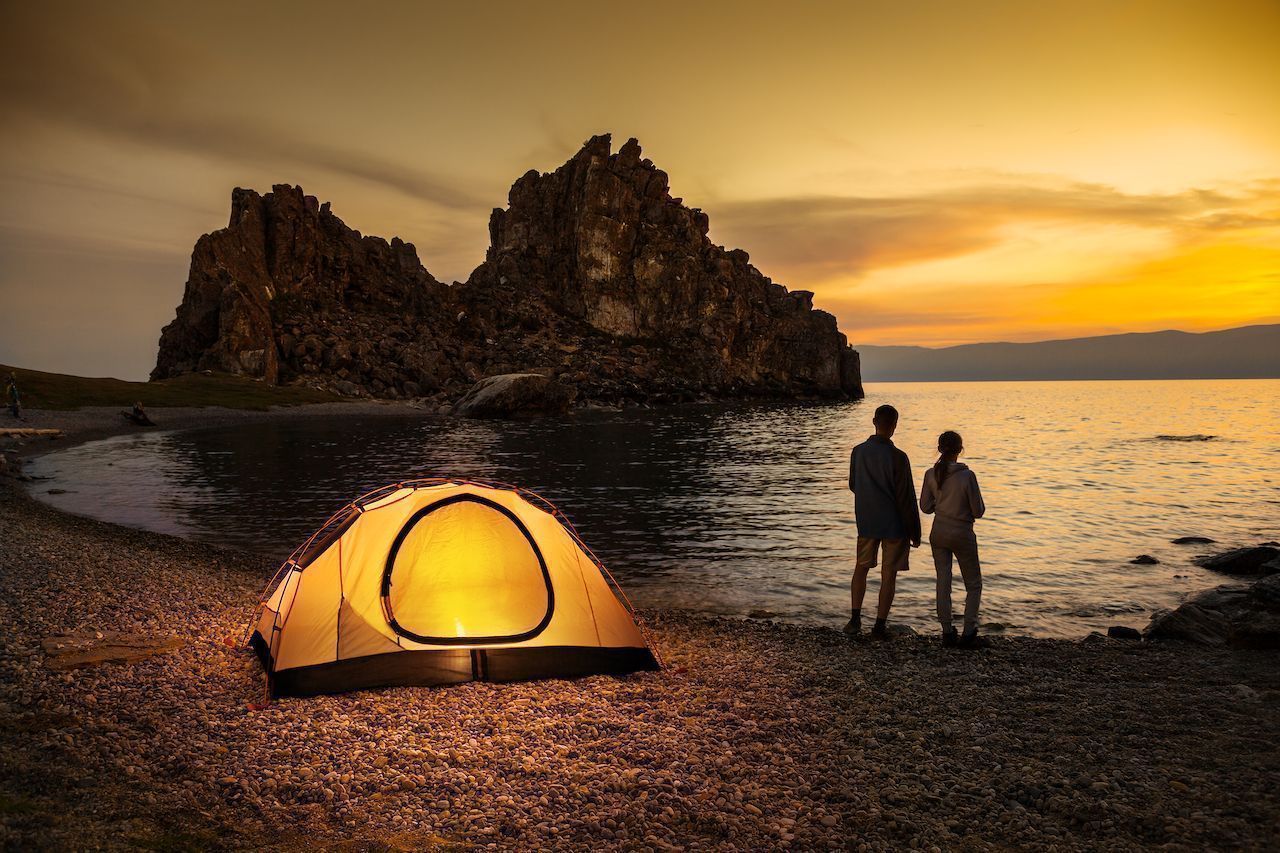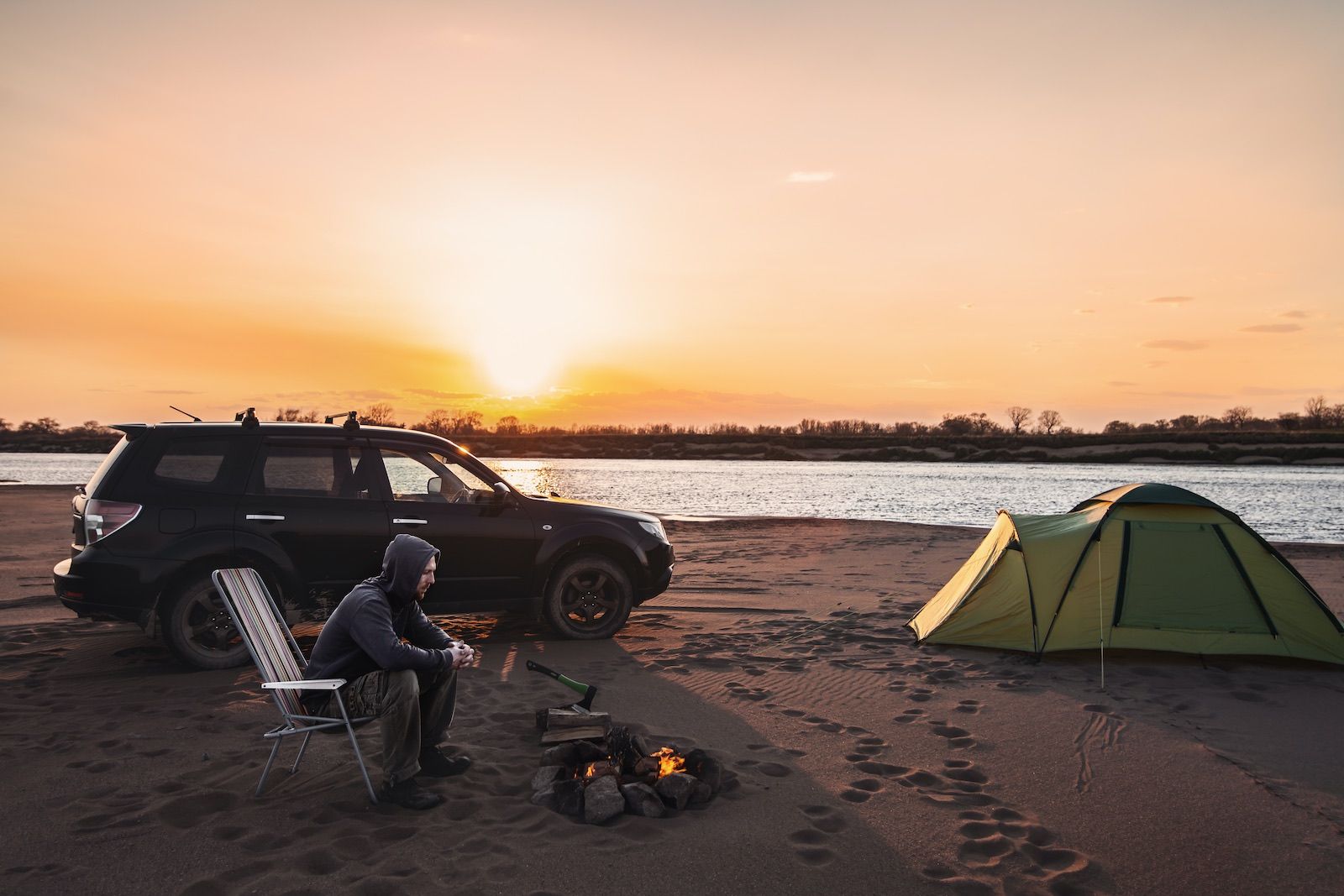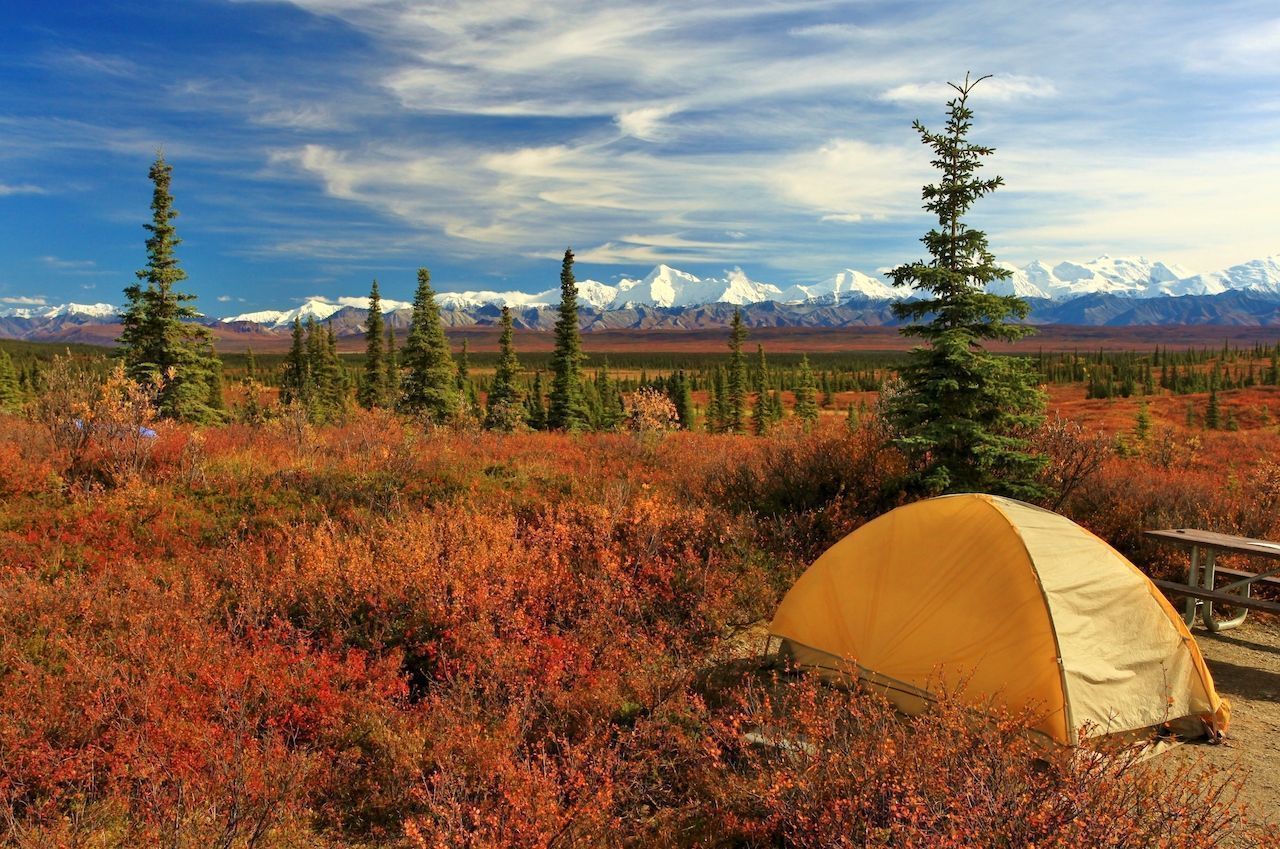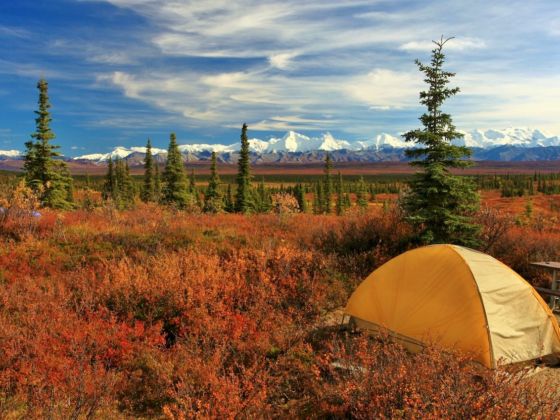One of my earliest memories is of a ravine. It cut through the forest floor like some invisible branch of the nearby Chattahoochee River, only dry, filled with sweet gum leaves and pine needles. Along the steepest walls were exposed patches of Georgia red clay. I loved streaking my fingers through them, taking in their cool damp smell. The ravine was probably just 50 feet from the back door of my childhood home in Marietta, and yet, to a boy of five, it was like being within a canyon, a secret world.
This was the first place I remember being drawn to. In a sense, it was the first place I ever traveled. It originated a certain feeling that continues now, decades later as I explore rivers, mountains, and coastlines from Mexico to Patagonia to the Pacific Northwest — a kind of consciousness about entering a place, inhabiting it with all of your senses, and in a way, letting it inhabit you.
At night I would lie in my bed and listen in the darkness. Even as a small child, I was aware of how the things I saw from that ravine –the squirrels, box turtles, blue jays — didn’t just ‘go away’ when I went back home. There had to be some continuation, some new form that the outside world took at night. As darkness came in the summer, the woods seemed to almost pulse with cicada sounds, frogs, field crickets. It was as if that world was communicating something, but whatever it was, we were shut off from it, snug in our bedrooms.
At age 11, I went to Camp Mondamin in Western North Carolina. Although this would be the first time away from my parents for several weeks, I was already a very independent child and the preparations completely fascinated me. The camp sent a packing list that included gear I’d never had before — a mess kit, a poncho, a roll of parachute cord, moleskin (for blisters), a sleeping bag and stuff sack. My dad and I shopped for everything, my mom helping me check off all the items on the list.
Mondamin was a traditional camp. It was all boys (girls had a separate camp, Green Cove), with a history going way back to the Depression era; there were sports and other activities, but their real focus was on what they called “life-skills.” This meant proper fire-making, plus navigating water (swimming, sailing, whitewater canoeing and kayaking) and land — camping in the backcountry. They took it seriously.
My first overnight camp out was with about 10 other boys and a couple counselors. We began at a kind of gear shed where they outfitted us with external frame packs, tarps, tents, and sleeping pads. They taught us how to secure our sleeping bags to the frames of our packs using lengths of parachute cord, tying them off with square knots. And we each got a small ration of snacks: an apple, an orange, a granola bar.
We hiked single file along a dirt road for a while. It was hot and there was a heavy buzzing of insects. Occasionally we’d hear a car and start calling up and down the line “Graveyard!” as we’d been taught. Other than that, there was little talking, which I liked. The sound of our boots on the dirt road had a certain rhythm — youthful, on a mission.
We foraged for a while in a thick bramble of blackberries, then cut into the woods where it was immediately cooler. This was the headwaters of the the Green River, a steeper, higher, and more open forest than I was used to back in the Georgia Piedmont. After climbing for a while, we reached the top of a broad knoll. A meadow sloped gently away down the other side. Our counselors wordlessly dropped their packs, leaning them up against trees at the edge of the knoll.Without having said anything, they’d forever imprinted on me a lesson about camping: You want to be higher up than the surrounding land, in a place where water will drain away. And yet, you don’t necessarily want to be all in the open, exposed. Within the margin of trees at the clearing, the counselors began instructing us how to set up camp, starting with the tarps (always have a dry place to work from first if necessary), then the tents, and finally — further out under the open sky — the fire circle.
I instantly fell in love with the different tasks: gathering wood, stringing up the shelters, helping carry water back up from the creek, and later the food prep. I’d never done work that so directly shaped my immediate reality. The dinner we’d eat that night, the beds and shelters we’d sleep in — everything came down to what we made with our hands. The counselors disapproved of anything that wasn’t taut, trim, correctly done. “A not neat knot need not be tied,” was one of their maxims.

Photo: Stas Tolstnev/Shutterstock
In the Blue Ridge there’s a naturally occurring fog or haze that settles over the valleys, often making things look smoky at dusk and dawn. As we worked into the evening, the haze began filling in and the colors deepened. My dad had told me once — perhaps a warning handed down from his father — that you had to be careful not to get lost in the woods at twilight because “everything starts looking the same.” But as I crisscrossed over the woods along the knoll that evening, I felt nothing like fear. It was more like I was memorizing each contour of land, each distinct feature — a boulder jutting from the open meadow, a stand of Joe-Pye weed, a dead black cherry slanting over where it was caught mid-fall in the crown of a tulip poplar. At the top was our camp — distinct from, yet still blending into the landscape. I was proud of it.
I don’t remember much about that night except for sitting up by the fire and looking at stars. It was early June and there likely would have been fireflies rising from the meadow. We probably sang songs and listened to ghost stories. I do remember that it got cold during the night, and I woke up various times. Each time I was aware of different sounds. As it got later and later, the chorus of insects and frogs quieted and there was a different quality of sound, a deep stillness.
Near dawn I woke up again. My feet were cold, but more than anything I felt a dreamlike kind of awareness. It was as if having memorized the landscape the night before, then spending the night outside, I’d earned some kind of power, some primal sense of being placed. I sat for a moment just listening to the silence broken through with occasional birdsong.
I stuck my head out of the tent. The predawn colors were just beginning to lighten the sky over the knoll. Shivering somewhat, I slipped out into that early morning — the first time in what’s become a lifetime habit of rising before the sun when I’m camping. Nobody else was up yet, and I moved silently along the dim, bluish outline of the tents.
I put my hand over the ashes of the fire. It was still warm. I stirred around in the powdery whiteness with a stick, uncovering a few small embers. Then, as I’d been taught, I added thready twigs of hemlock as tinder, and gently blew them into flame. For the next period of time, which could’ve been five minutes or 50, I sat and warmed myself by the fire. I was a shy kid, introspective, intense, serious. Regardless of the group, I always felt somewhat like an outsider. The woods, however, always gave me a sense of identity, of belonging.
Of course, as a boy of 11 I never could’ve articulated this. And yet sitting there tending the fire at dawn, I was internalizing it somehow.
As a college student at UGA, I would go back to Marietta each summer, teaching those same outdoor skills at a camp called High Meadows, just a few miles from that original ravine. I was adrift somewhat in my studies — a pre-med major who’d lost all his interest in becoming a doctor. I found, however, in working with kids, that I had a natural gift as a teacher. High Meadows was 40 acres of farmland and forest, and my “pioneering” classes would often turn into epic off-trail explorations, through creeks and thickets to places where we were as far from any car noise or human sound as possible. Sometimes we’d drop down into the creek beds, hidden from view. There, circled up, their young faces on me, I’d say something like, “Do you hear that?” looking up into the forest as if I could hear something in particular.
They’d look at me quizzically. There would be no other sound except for the trickle of the creek, the wind, the cicadas.
After graduating (I’d switched my major to English), I had no job lined up other than my summer session at High Meadows. I had no real direction either. It’s not that I didn’t work hard, nor that I wasn’t motivated — I just didn’t know what I wanted to do. If I was totally honest with myself, all I wanted was time in the woods. I wanted to camp night after night. I wanted that feeling of gearing up for a mission.
It occurred to me to hike the Appalachian Trail. Suddenly there was a shape, a direction to my immediate future. I started breaking in a heavy pair of boots that spring, actually wearing them to graduation, and throughout the summer session at High Meadows. I relished the process of selecting what would be by far my heaviest gear up till that point: a -10 degree down sleeping bag, a four-season tent, and a waterproof parka.

Photo: Shutterstock/Yury Stroykin
My plan was to fly up to Maine in the end of August, and then begin hiking southbound, chasing fall all through Maine and New Hampshire, and just seeing how far I got into winter.
Once I got to Baxter State Park, climbing Mt. Katahdin, and then entering the 100 Mile Wilderness, I began crossing paths with gaunt, northbound thru-hikers on their final stretch. People were hiking huge days, 20+ miles, and I realized fairly quickly that my motivations for being out there were way different. Whereas most people looked at long trails as endurance tests, the implicit goal being to finish, all I really wanted was just to explore Appalachia. To be living out of a backpack, a tent. It made sense to be going in the opposite direction, where, within a matter of months, there would be nobody left on the trail, nothing but empty woods.
Three months into the trail, I’d linked up with the only other thru-hiker heading south into the winter. Corey and I had covered nearly 1,000 miles together, had become brothers of the trail. The day before, we’d hiked 18 miles traversing the long, boulder-strewn plateau of Blue Mountain. We thought we’d do another big day today, pushing past Bake Oven Knob Shelter, all the way to the Allentown Hiking Club Shelter. A few miles past Bake Oven, though, after rock hopping through more and more intense boulder fields near Bear Rocks, we both had very sore feet and decided to just camp at New Tripoli Campsite, less than a half mile down a blue blaze trail.
New Tripoli was closed for the winter. We expected this — it just meant we could set up wherever we wanted — but in truth the whole area seemed a bit grim, abandoned. The shrubby stands of chinkapin oak were all leafless, the sky already darkening at 5:30. But at least, after weeks of hard weather, the sky looked clear.
I set up a primitive shelter, tying paracord around an oak tree, then sloping it down to a stake roughly 8 feet away. Over this center line I draped an 8’ x 10’ tarp, staking the corners down so the shelter resembled a basic tent with the open end protected by the tree trunk. Corey set up his single-person tent nearby.
I think both of us were looking forward to an easy hike out tomorrow, and we turned in early that night after dinner. I burrowed into my shelter — a simple pad lying on dry leaves beneath the tarp.
Sometime during the night I awoke to a sloughing sound. I reached up — the tarp had sunk down to just a foot or so from my nose. I pushed up against the tarp roof and felt a heavy pillow of snow. I punched at it, and the tarp rose back up closer to its position. Then I punched at the other side. I cut on my headlamp and looked out towards the tree. Fat flakes fell steadily through the beam. Luckily there was little wind, otherwise it may have blown into the open end of the shelter. I wedged my pack into the opening as a kind of door.
Over the next several hours, I repeated this pattern over and over. Wake up, punch at the ceiling, go back to sleep. The snow had a dampening effect on all sound; it was windless, steady snow and absolute silence.
In the morning I pushed the pack out of the way and climbed into another world. Everything was buried under half a foot of snow. My shelter looked like nothing more than a gentle snowy rise. Corey’s tent was completely buried as well. The landscape had been reset. There were no tracks. I sat for a while, transfixed at the blanket of snow I’d slept beneath. How many times do we go to bed each night, and then wake up the next morning without ever being aware of the outside world?
The hike out was unusually serene. The sun was breaking out from the clouds, sparkling on the fresh powder. We didn’t know it then, but each of us had just a couple more months on the trail before winter conditions and injuries would finally send us home.
Years later, talking about this time in our lives, Corey would draw the metaphor that, “It just felt like we were on the right path.” We had all of our decisions ahead of us: Where to live. Who to be with. What to do for work. What we wanted our lives to become. But somehow living outside brought a clarity, a sense that even though we didn’t have the answers, at least we were oriented, moving in a certain direction.
I would go on to teach back in the Athens Montessori School. There we started a tradition of camping out with the students as a way of bonding before the long school year. We explored places in the Chattooga and Tallulah watersheds, spots I’d learned through my years of camping and paddling since I was a boy at Mondamin.

Photo: Juancat/Shutterstock
But after a couple of years, I was restless. I wanted to see other parts of the world. I began traveling, through Costa Rica, Ecuador, Nicaragua, El Salvador. I lived for weeks at a time, camped out along points and rivermouths, learning to surf, learning to speak Spanish. Starting, it seemed, all over again, learning as if I were once again 5 years old.
In a superficial sense, I was a vagabond for years, heading back to the US to work seasons in construction or at ski resorts, all just to make enough money to get back down to Latin America so I could live out of my tent and keep surfing.
But in a deeper sense, I was following my instinct, collecting stories, finding my way towards what would eventually become a career that combined storytelling, journalism, and travel.
In the pursuit for outward success, so often what’s lost is that primal instinct you had as a kid. For me it was the ravine, the terrain. It’s always been that way. A day spent outdoors is never wasted. And an overnight seals it into you forever. Sleeping under the snow blanket may have been an obvious, visceral example, but each time I’ve camped, there’s always been a similar effect. I emerge into the next day as if visiting the world again for the first time.

